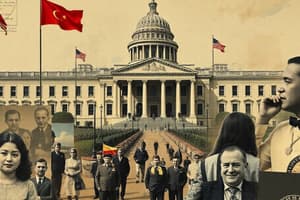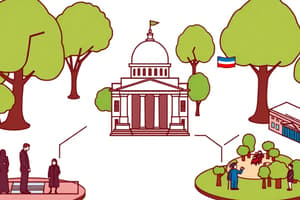Podcast
Questions and Answers
_________ is often cited as one of the most successful examples of a functioning direct democracy.
_________ is often cited as one of the most successful examples of a functioning direct democracy.
Switzerland
The principle of separation of powers divides government into different branches, each responsible for specific tasks. This helps prevent any branch from becoming too powerful and fosters checks and balances within the system. The three main branches typically found in constitutional republics are: - Executive Branch: Responsible for enforcing laws and managing day-to-day operations. Heads of state such as presidents, prime ministers, or governors serve in this capacity. - Legislative Branch: Lawmaking body responsible for creating and amending laws. Members may be elected based on party affiliation or proportional representation systems. - _________ Branch: Interprets laws and determines their legality when challenged. Judges handle disputes between individuals and organizations.
The principle of separation of powers divides government into different branches, each responsible for specific tasks. This helps prevent any branch from becoming too powerful and fosters checks and balances within the system. The three main branches typically found in constitutional republics are: - Executive Branch: Responsible for enforcing laws and managing day-to-day operations. Heads of state such as presidents, prime ministers, or governors serve in this capacity. - Legislative Branch: Lawmaking body responsible for creating and amending laws. Members may be elected based on party affiliation or proportional representation systems. - _________ Branch: Interprets laws and determines their legality when challenged. Judges handle disputes between individuals and organizations.
Judicial
The principle holds that all people, including those in positions of power, must abide by the same set of laws. It helps maintain fairness and stability within society by ensuring equal treatment under the law. This principle is known as the _________ of Law.
The principle holds that all people, including those in positions of power, must abide by the same set of laws. It helps maintain fairness and stability within society by ensuring equal treatment under the law. This principle is known as the _________ of Law.
Rule
The three main branches typically found in constitutional republics are: - _________ Branch: Responsible for enforcing laws and managing day-to-day operations. Heads of state such as presidents, prime ministers, or governors serve in this capacity. - Legislative Branch: Lawmaking body responsible for creating and amending laws. Members may be elected based on party affiliation or proportional representation systems. - Judicial Branch: Interprets laws and determines their legality when challenged. Judges handle disputes between individuals and organizations.
The three main branches typically found in constitutional republics are: - _________ Branch: Responsible for enforcing laws and managing day-to-day operations. Heads of state such as presidents, prime ministers, or governors serve in this capacity. - Legislative Branch: Lawmaking body responsible for creating and amending laws. Members may be elected based on party affiliation or proportional representation systems. - Judicial Branch: Interprets laws and determines their legality when challenged. Judges handle disputes between individuals and organizations.
Understanding the workings of various government systems can help citizens engage more effectively with their civic duties. By learning about these structures, individuals can better understand how they are represented and make informed decisions when participating in democratic processes such as voting or protesting. Moreover, knowledge of government systems enables individuals to advocate for changes they believe would improve their communities or nations based on empirical evidence and well-reasoned arguments. In conclusion, studying government systems provides essential context for understanding modern political dynamics and informs decisions related to civic participation. Learning about historical and contemporary forms of government allows us to appreciate both the successes and challenges faced by societies throughout time while also inspiring more thoughtful engagement in our own _________ institutions.
Understanding the workings of various government systems can help citizens engage more effectively with their civic duties. By learning about these structures, individuals can better understand how they are represented and make informed decisions when participating in democratic processes such as voting or protesting. Moreover, knowledge of government systems enables individuals to advocate for changes they believe would improve their communities or nations based on empirical evidence and well-reasoned arguments. In conclusion, studying government systems provides essential context for understanding modern political dynamics and informs decisions related to civic participation. Learning about historical and contemporary forms of government allows us to appreciate both the successes and challenges faced by societies throughout time while also inspiring more thoughtful engagement in our own _________ institutions.
Flashcards are hidden until you start studying
Study Notes
Government Systems
Government systems refer to the structures, institutions, and procedures that govern a country or region. Understanding these systems is crucial for participating in civic life and maintaining a functioning democratic society. This article explores various types of government systems throughout history and their implications for modern civic engagement.
Forms of Governments
Throughout history, several forms of government systems have emerged, each with its own unique characteristics and advantages. Some of the most common forms of government systems include:
-
Monarchy: Ruled by a single person, typically a king or queen. Monarchies can be absolute, with the ruler holding almost unlimited power, or constitutional, with restrictions on the monarch's authority. Examples include the United Kingdom, Saudi Arabia, and Japan (constitutional).
-
Dictatorship: Rule by a single individual, who often seizes power through force or manipulation rather than election. Dictatorships can last for extended periods if the dictator maintains control and manages to maintain popular support. Examples include North Korea under Kim Jong-un and Fidel Castro's Cuba.
-
Constitutional Republic: This form of government combines elements of democracy and republicanism. Power lies with elected representatives rather than a monarch or dictator. The Constitution sets out the rules for how power should be used and protected the rights of citizens. Examples include the United States, France, and Italy.
-
Direct Democracy: In direct democracies, citizens participate directly in making decisions on policy matters through voting or other means. Switzerland is often cited as one of the most successful examples of a functioning direct democracy.
Key Components of Government Systems
Separation of Powers
The principle of separation of powers divides government into different branches, each responsible for specific tasks. This helps prevent any branch from becoming too powerful and fosters checks and balances within the system. The three main branches typically found in constitutional republics are:
-
Executive Branch: Responsible for enforcing laws and managing day-to-day operations. Heads of state such as presidents, prime ministers, or governors serve in this capacity.
-
Legislative Branch: Lawmaking body responsible for creating and amending laws. Members may be elected based on party affiliation or proportional representation systems.
-
Judicial Branch: Interprets laws and determines their legality when challenged. Judges handle disputes between individuals and organizations.
Rule of Law
This principle holds that all people, including those in positions of power, must abide by the same set of laws. It helps maintain fairness and stability within society by ensuring equal treatment under the law.
Impact of Government Systems on Civic Engagement
Understanding the workings of various government systems can help citizens engage more effectively with their civic duties. By learning about these structures, individuals can better understand how they are represented and make informed decisions when participating in democratic processes such as voting or protesting. Moreover, knowledge of government systems enables individuals to advocate for changes they believe would improve their communities or nations based on empirical evidence and well-reasoned arguments.
In conclusion, studying government systems provides essential context for understanding modern political dynamics and informs decisions related to civic participation. Learning about historical and contemporary forms of government allows us to appreciate both the successes and challenges faced by societies throughout time while also inspiring more thoughtful engagement in our own democratic institutions.
Studying That Suits You
Use AI to generate personalized quizzes and flashcards to suit your learning preferences.




